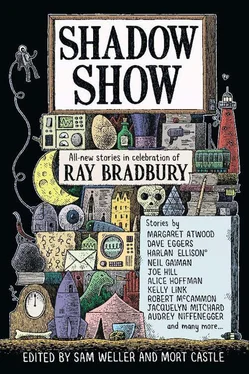My drinking, for one, which I had to admit had become more frequent those last months. “Look at that couch,” she said. “You bought that when you were drunk. Just look at that ugly couch.”
I didn’t know how to explain that I’d bought it because I’d given an innocent salesgirl cause for alarm. I didn’t know how to say I’d wanted to prove I was a decent man.
Vonnie went on with her list. The way I’d stopped being her friend, she said. “I used to be able to count on you, Lex.” She stopped before she filled in the rest, the part about how I wasn’t there for her anymore and hadn’t been for some time.
Guilty. We were strangers. Like everyone, we’d set forth with no idea of that ever happening, but it had, and now there we were.
Not for long, though.
“I’ve found a townhouse,” she told me. “I’m moving out.”
So there were two stories causing quite a buzz in Saddlebrook Estates that spring—Popcorn was missing, and my wife, after thirty-three years of marriage, had left me. I was fifty-five years old, and I was alone. I didn’t even have Henry because the night Vonnie packed as much as she could into her car, saving a space for his carrier, he slipped out the door, and when it came time for her to gather him up, he was nowhere to be found.
“I’m sure he’ll come back soon,” I told her.
We stood in the driveway in the dark, keeping our voices low because the neighbors were out—the Hartwells and the Ship-leys and the Biminrammers, everyone talking about Popcorn and poor Mr. Mendes—and we didn’t want them to hear us.
“Call me when he does,” she said. She opened the door to her Explorer, an SUV now stuffed with what she’d decided was most important to her, important enough to carry away from our house. She turned back to me. “Call me on my cell.”
I stood there a long time after she’d driven away. My life felt strange to me, and I didn’t know what to do next.
Then I saw him. Henry. He came from the direction of Mr. Mendes’s house, slinking, belly low, across the street. I saw him as he passed through the glow of the streetlight. Then he disappeared into the darkness, and I didn’t know where he was until, finally, I felt him rubbing against my leg.
We went inside. I picked up the phone, meaning to call Vonnie’s cell, meaning to tell her to come back and get Henry, but then he jumped up on that couch and began primping it with his front paws, making his bed, getting comfortable. He didn’t care how ugly that couch was. He just knew it was a good place to sleep after being out on the town, a comfort I’d provided for him. He looked up at me once and meowed without making a sound. Then he closed his eyes and went to sleep, and I couldn’t make that call. It was the two of us now.
As the days went on, Vonnie kept calling to see if Henry had come home. “Haven’t seen him,” I told her. “Are you doing okay?”
“Yes. You?”
“Sure,” I said.
But the truth is I was pretty low, and I think it started to get to Henry—the way I moped around. Even though I’d known a long time that things were over between Vonnie and me, I hadn’t counted on this tremendous pit of loneliness that invited me to sink into it. To make matters worse, the neighbors were spending all their sympathy on Mr. Mendes and poor, poor Popcorn. Granted, Vonnie and I had never really been close with the Hartwells or the Shipleys or the Biminrammers, but still, I thought that once word was out about our breakup, someone would express concern.
I’d see Missy Biminrammer walking her sheltie, or Chick Hartwell mowing his lawn, or Peg Shipley working in her flower beds, and I’d give a wave and wait for them to say something about not seeing Vonnie around for a while, but they just waved back and didn’t say much of anything at all except to tell me to keep an eye out for Popcorn.
One evening I saw Herb Shipley washing his car in his driveway. I walked down the sidewalk, past the Biminrammers’, who lived next door to me, and the Hartwells’ on the other side of them, until I was standing in the Shipleys’ drive, out of the way of the spray coming from Herb’s hose. Henry was stretched out on the sidewalk in the sun. He rolled over onto his back and closed his eyes.
Herb was washing the vintage 1963 Thunderbird—red with a black ragtop—that he’d restored. He was an industrial-arts teacher at Davidson High School, a wiry man with a nice head of silvery hair. He didn’t have much of a chin, which made it seem that his lips were stretched tight in a constant state of alarm, as they were now when he turned and saw me standing there.
I just blurted it out. It makes me feel like an idiot to think of it now. I said, “My wife left me.” Maybe it was that look on his face. Maybe it was the fact that I thought of him as an angry man and assumed he’d be angry for my sake. “Vonnie,” I said. “She’s gone.”
He was holding the hose with the nozzle pointed in my direction, and to anyone who might have been watching, it probably looked liked I’d said something he didn’t like and he was about to squirt me in the face.
But all he said was, “Did you hear? Mendes just got a call. A woman in Plain City. She thinks she’s found Popcorn.” He was there now, Herb explained. “We’re all hoping for a happy ending.”
Just then, Henry jumped up onto the trunk of the T-Bird. He stood up on his hind legs so he could reach the ragtop, and then he went to town, picking at it with his claws.
“Henry,” I said. “No.”
But it was too late. Herb turned around and saw what was happening—that ragtop getting shredded—and he did the only thing he could. He turned that hose on full blast. The force knocked Henry off the T-Bird. He landed on his feet and shook himself. His fur was slicked down with water, and he didn’t wait around to see what might be coming next. He took out up the sidewalk as fast as he could run. I watched him until he disappeared around the side of my garage.
“I’ll pay for whatever it costs to fix that,” I said to Herb.
“Damn straight you will.” He looked past me, and I heard a car turning down our court. I wondered if it might be Vonnie coming back to give us one more try. Then, before I could turn to look, Herb said, “It’s Mendes.”
It didn’t take long for the word to spread. Peg came out the front door as if she’d been watching, and who knows, maybe she had been.
“It’s him,” Herb said, and the two of them brushed right past me and started up the street.
Chick and Connie Hartwell came out of their house to join them. Even Benny and Missy Biminrammer tagged along to see whether Mr. Mendes had indeed recovered Popcorn.
I stood there watching as Mr. Mendes got out of his Volvo, and the neighbors gathered around him. He said something and then bowed his head. Connie Hartwell put a hand on his shoulder, and I heard Herb say, “Damn it all to hell,” and I knew that the woman in Plain City had turned out to have the wrong bird.
Everyone stood in Mr. Mendes’s driveway talking, and I went back to my house, where Henry, wet and trembling, waited for me to let him inside.
“Damn it, Henry,” I said. Then I opened the front door. He stayed on the step, hesitating, as if he knew I was going to be out some cash for what he’d done to Herb’s ragtop. “Come on,” I said. “You know that couch just won’t look right without you on it.”
I swear he was pissed off the rest of that night and the days that followed. He prowled around the house, letting out these guttural yowls. I opened the door to see if he wanted to go outside, but all he did was come to the threshold, sniff at the air, yowl some more, and then head for the couch.
One day, he got up on the window seat, where I sat watching the whoop-dee-do across the street. Herb Shipley had volunteered to weld Popcorn’s cage to an iron rod and then anchor it to Mr. Mendes’s roof. I watched Herb bolt it to each side of the roof ridge. Mr. Mendes watched from the ground, his head tipped back, his hand shading his eyes from the sun. When Herb was done, he left the cage door open, so Popcorn could fly right in if he happened to be in the vicinity and took a notion. Herb climbed down the ladder, and Mr. Mendes solemnly shook his hand.
Читать дальше



![Lord Weller - Ритера или опасная любовь [СИ]](/books/421202/lord-weller-ritera-ili-opasnaya-lyubov-si-thumb.webp)








